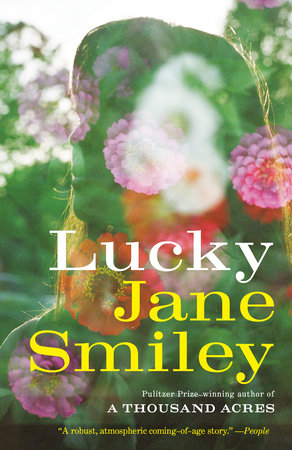Jane Smiley
Pulitzer Prize-winning author and essayist

Photo credit: Mark Bennington
-
About Jane Smiley
Jane Smiley has been praised as “a diverse and masterly writer” (The New York Times Book Review) and “one of the premier novelists of her generation, possessed of a mastery of the craft and an uncompromising vision that grows more powerful with each book” (The Washington Post). Her most recent project, Lucky, is a soaring, soulful novel about a folk musician who rises to fame across our changing times.
Smiley has written about politics, horse training, sex, Hollywood, farming, literature, marriage, Barbie . . . and the list goes on. It’s no wonder Time magazine once asked, “Is there anything Jane Smiley cannot do?”
During her years as a published author—her first novel was published in 1980—two of Jane Smiley’s novels have been made into movies: A Thousand Acres, for which she won the Pulitzer Prize in 1992, and The Age of Grief, which was developed into The Secret Lives of Dentists.
The recipient of an MFA and a Ph.D., Jane Smiley is the author of twelve novels, as well as many essays for such magazines as Vogue, The New Yorker, The New York Times Magazine, Harper’s, Practical Horseman, and others. She has been a Fulbright Scholar (a year in Iceland) and was a professor of English for 15 years at Iowa State University, where she taught creative writing workshops at the undergraduate and graduate level. She was elected to the American Academy of Arts and Letters in 2001, and in 2006 she was awarded the PEN USA Lifetime Achievement Award for Literature.
Contact us for more information about bringing Jane Smiley to your organization.
-
Speaking Topics
The Writing Process
The writing process is usually different for every writer, but some similarities prevail--sticking with it, being as impervious to criticism as you can, and being so curious about both words and events that you simply can't resist getting on with your work. Books are mysteries that reveal themselves first to the writer, then to the reader. They lead you on. In this lecture, Smiley explores how this happens.
The Life of a Writer
The life of a writer is a little like the life of an explorer, but what you are exploring is not (or not entirely) landscape. You are also exploring feelings, ideas, and the ways actions play out over time. A novel is a piece of logic that is a little similar to life, but not exactly similar. In this talk, Smiley discusses and analyzes the similarities and differences between the two.
-
Video
-
Praise for Jane Smiley
Jane Smiley was wonderful to have here at the Marion Public Library. She was very engaging with the audience. We enjoyed her method of having the audience ask her questions in order to prompt her presentation. She had very interesting stories. During the book signing, she took her time talking with those who purchased books. She was a delight to have at Marion Public Library.
— Marion Public LibraryJane was very well received! Our students and faculty thought that she was delightful–witty, sincere, and at ease, as well as brilliant, of course. We had an excellent turnout for every event, including quite a few community members, and faculty members and professionals from other units, and everyone seemed to be enjoying themselves very much.
— University of MichiganPraise for Lucky
A delightful trip through the 20th century’s greatest hits . . . This is life as a lesson in how to live, for which you must write your own instructions as you go along . . . Luckily, this is Jane Smiley, so the details, the insights, the songs—those she writes, and the dizzying assortment she mentions—are entertaining.
— Washington PostA robust, atmospheric coming-of-age story.
— PeopleSpellbinding . . . Smiley neatly reverses the usual story of a 1970s singer [and then] orchestrates a seismic twist of staggering magnitude . . . Every novel by Smiley is a surprise.
— Booklist (starred)Praise for Golden Age
A literary historical panorama. . . . The power of Smiley’s project ultimately lies in her ability to situate her readers here, on the edge of a new world.
— Milwaukee Journal SentinelAmbitious, absorbing. . . . Golden Age flows with the nuances and rhythms of everyday life, with time passing steadily, through births and deaths, triumph and tragedy.
— Miami HeraldBreathtaking. . . . Epic. . . . With The Last Hundred Years trilogy, [Smiley] surely confirms her place alongside Roth, Updike and Bellow as one of the truly great chroniclers of 20th-century American life. . . . A powerful, moving and rewarding experience.
— The GuardianStrike[s] a fine balance between the history of an era’s ‘great ideas’ and the history of its everyday life. . . . It’s a small miracle how much ground Smiley covers and how much she knows: about biochemistry, horses and genetics, but also medieval literature, financial instruments and especially politics.
— The Washington PostPraise for Some Luck
Exciting...In the first volume of a planned trilogy, Smiley returns to the Iowa of her Pulitzer Prize winning A Thousand Acres, but in a different vein. The Langdons [are] a loving family whose members, like most people, are exceptional only in their human particularity; the story covers the 1920s through the early ‘50s, years during which the family farm survives the Depression and drought, and the five children grow up and have to decide whether to stay or leave. Smiley is particularly good at depicting the world from the viewpoint of young children—all five are distinct individuals from their earliest days. The standout is the oldest son, Frank, born with an eye for opportunity. But as Smiley shifts her attention from one character to another, they all come to feel like real and relatable people. Smiley conjures a world—time, place, people—and an engaging story that makes readers eager to know what happens next. Smiley plans to extend the tale of the Langdon family well into the 21st century; she’s off to a very strong start.
— Publishers Weekly (starred review)Smiley follows an Iowa farm family through the thick of the 20th century, [as] the Langdons raise five children to varied destinies; [there’s a] sense that we’ve simply dropped in on a continuing saga. Smiley juggles characters and events with her customary aplomb and storytelling craft...Underpinning the unfolding of three decades is farm folks’ knowledge that disaster is always one bad crop away, and luck is never to be relied on; it wouldn’t be a Smiley novel without at least one cruel twist of fate. Smiley is the least sentimental of writers, but when Rosanna and Walter Langdon look at the 23 people gathered at Thanksgiving in 1948 and ‘agreed in an instant: something had created itself from nothing,’ it’s a moment of honest sentiment, honestly earned. An expansive tale showing this generally flinty author in a mellow mood: surprising, but engaging.
— Kirkus Reviews (starred review) -
Books by Jane Smiley
-
Media About Jane Smiley
Request Fees
and Availability
- 212 572-2013
- Jane Smiley travels from Carmel Valley, CA
Featured Title

Lucky
“Lucky is framed as a rock’n’roll novel, but it’s a tricky and surprising one. Smiley seems determined to upend the conventions of the genre . . . What emerges instead in Lucky is a simple yet provocative idea—what if a woman protagonist were allowed to live independently on her own terms, not tied down by typically novelistic men or the bad blood that infects family life? . . . The novel’s title, upbeat on the surface, is darkened by the notion of how rare such a character is . . . Life and death flow in and out, and Smiley observes it clearly but empathetically. (Not for nothing is Dickens among her favorite writers.) . . . There’s no signal that Lucky is Smiley’s final book, but if it were, it would make for an admirable summing up—the story of a well-traveled, keen-eyed writer who’s spent decades making sense of the world in words, and taking pleasure in it for its own sake. A lucky way to make a living.” —Mark Athitakis, Los Angeles Times



























